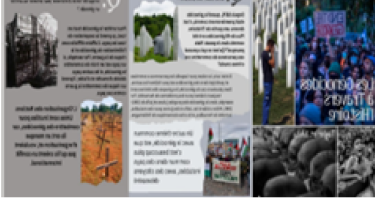
News From the Nest- Spotlight on Learning: Preventing Genocide
Spotlight On Learning
How, as responsible citizens, can we contribute to preventing the recurrences of Genocides?
Presented by: Babinee Mallo
Subject: French Immersion History 12
TEACHER DESCRIPTION and / or REFLECTION:
After having studied the different war crimes with a heavy focus on the Holocaust, my aim was to deepen students' comprehension of past genocides and present-day similarities. To do this, students focused on topics pertaining to human rights, conflicts involving different ethnic and religious groups, and programs that support tolerance, diversity, and peace. They were prompted to consider their own values and beliefs as a result of the ethical and moral issues—such as accountability, responsibility, justice, and reconciliation - that are brought up by genocides. Students were able to gain empathy and understanding for the experiences of people impacted by genocides through documentaries and real-life experiences, which improved understanding all around. Researching more about different genocides and their underlying causes is crucial for enhancing students’ awareness and knowledge, for not only a better understanding but also to help prevent future genocides. Furthermore, collaborating with a partner, they explored four distinct sub-inquiry questions: How is it possible for educated and seemingly normal people to engage in acts of such brutality? What measures should be taken, on an individual level, to ensure that such tragedies never happen again? In light of previous genocides, how much do you think the UN should be doing to stop these crimes against humanity? What obstacles and problems can the international community face while trying to intervene to stop or prevent a genocide? They then presented their findings in a format of their choice, allowing for individualized approaches tailored to each pair’s preferences.
STUDENT REFLECTIONS:
One enjoyable aspect of this project was the questions that required you to think more critically and make connections to the present situation. These specific questions were designed so you think out of the box and learn how to better analyze and deepen your understanding on your own or with a partner. An example of this is “Why do you think it is possible, that seemingly normal people engage in genocide and inhumane crimes?” Personally, this was a very thought-provoking question, considering it is not something most people ponder on daily. Since the project was to be completed in French, it was also a fantastic opportunity for us to practice our vocabulary, verb, and sentence structure. For me, one challenging element was working with a partner. Usually, I prefer working by myself to have better control over how to manage each part. Overall, it was a fantastic opportunity to learn more about past and current genocides along with reaching out of my comfort zone to practice my collaborative skills.